The tiny country of Rwanda is now producing factory-fresh Volkswagen cars from its rolling hills. Next up are ride-hailing and public car-sharing services by the German carmaker.
“Africa doesn’t need to be the dumping ground for second-hand cars or second-hand anything, because in the long run, you end up paying a higher price anyway. So if you can pay a high price for second-hand, why not pay a high price for something new?”
These powerful words were by Rwanda’s president Paul Kagame in a speech delivered at the launch of the Volkswagen (VW) assembly plant late June in the country.
The German carmaker, which now has a presence on the rolling hills of the Kigali Special Economic Zone, is the first international automobile giant to invest in Rwanda.
Loading...
It will have a capacity to produce up to 5,000 cars with a starting price of $23,000.
President Kagame observed that Africans deserve better and this is one way of showing how they can afford it.
“In the medium-term, the only way for us in East Africa to move up the industrial value chain from assembly to manufacturing is to build an integrated regional manufacturing base.”
For this to be achieved, he underscored the need to shift from the logic of competition to one of cooperation but also fuse the two “because when they are put together, everyone gains”.
READ MORE: The African Car That Is No More
Thomas Schaefer, the Chairman of VW Group South Africa, revealed that opening an assembly plant in Rwanda aligns with the firm’s strategy to strengthen regions, focusing on new and upcoming markets.
Schaefer admitted there are challenges but emphasized the project is bound to succeed.
“Having worked with emerging markets for a large part of my career, I can categorically say that Rwanda stands out as a country where it is about what we can do to make a project work rather than listing all the obstacles as to why something would not work,” he said in an interview to CNBC Africa.
VW joins Rwanda’s market at a time when the country is conducting the ‘Made in Rwanda’ program to support local industries and promote consumption of locally-made products.
Economic analyst Kenneth Agutamba believes VW’s entry into Rwanda lays the groundwork for other brands to tap into the market.
“It’s a big win. Every time a major international brand gets into a country, it boosts the confidence of other potential investors,” he tells FORBES AFRICA.
He adds that the investment is an opportunity for job creation in the country.
READ MORE: The World’s Most Popular Cars In 2017 Included Fewer Cars, More SUVs
“A single car has 30,000 parts and putting them together requires a minimum of 20 people. So it’s a very labor-intensive job.”
He explains that although Rwanda is a smaller market and landlocked, it has security, and political and economic stability, among other factors rare on the rest of the continent.
“It can be a base where major brands can build their headquarters but targeting the markets around it,” he says.
Clare Akamanzi, CEO of the Rwanda Development Board, hailed the development as a very important step and a new chapter.
“The fact that Volkswagen took time to study Rwanda and found it a good business case we can invest in here, means a lot for us. It’s something that shows feasibility of such business that can thrive in Rwanda and we expect other companies to emulate,” she told CNBC Africa.
Starting next year, the company will also offer ride-hailing and public car-sharing services under the Mobility Solutions program.
Lionel Mpfizi, CEO of AwesomityLab, a local company hired to provide a mobility solution platform commended VW for its openness to local companies in an interview with CNBC Africa.
“We are very happy that VW is open to work with local companies to achieve what they want to achieve. There’s something we are bringing to the table if we are local: we have the understanding, we know the clients and we are the clients,” said Mpfizi.
– By Steven Muvunyi
Loading...
